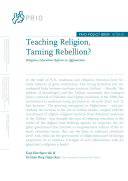In the wake of 9/11, madrasas and religious education have become subjects of great controversy. The strong historical and etymological links between madrasa students (‘taliban’ – literally, ‘the seekers of knowledge’) and the Taliban movement that emerged from a network of Pakistani and Afghan madrasas in the 1990s has contributed to madrasas being portrayed as ‘terrorist dens’ and ‘jihad factories’. The growing insurgency in Afghanistan – and particularly the increase in the use of suicide attacks, coupled with the recruitment of Afghan religious students from Pakistani madrasas to the Taliban – has brought the topic of religious education to the centre of the Afghan state-building agenda. In response, the Afghan government has initiated a comprehensive reform of the Islamic education sector. But, are the links to militancy substantiated? And, what can the government of Afghanistan and its foreign supporters do to enhance oversight of and collaboration with Afghanistan’s religious schools?
Borchgrevink, Kaja & Kristian Berg Harpviken (2010) Teaching religion, taming rebellion: Religious education reform in Afghanistan, PRIO Policy Brief, 7. Oslo: PRIO.


.jpg?x=400&y=600&m=Cover&)






